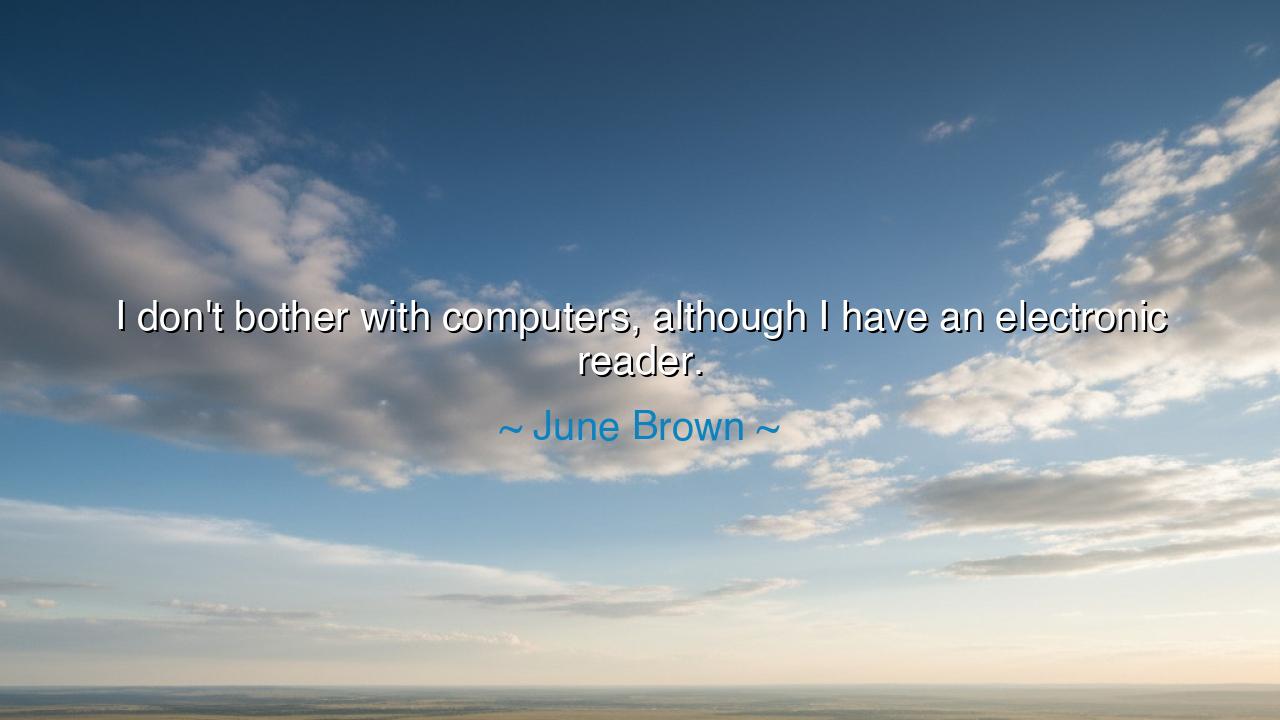
I don't bother with computers, although I have an electronic






When June Brown said, “I don’t bother with computers, although I have an electronic reader,” she spoke not only to the increasing dominance of technology in modern life, but to the delicate balance between progress and the preservation of personal values. Brown’s words reflect a certain wisdom — one that is wary of the overwhelming influence of digital technology, yet does not completely reject it. She acknowledges the usefulness of modern tools, like the electronic reader, but resists the lure of becoming consumed by the constant digital noise of computers. This is not merely a statement of preference; it is a quiet rebuke to the idea that we must surrender to every new technological advancement without questioning its impact on our lives.
In ancient times, the sages often spoke of the importance of moderation and reflection. The great Confucius taught that true wisdom comes not from the accumulation of knowledge, but from the ability to reflect on that knowledge and use it wisely. In much the same way, Brown’s stance can be seen as an acknowledgment that while the world races forward with the rapid growth of technology, we must remain mindful of how it shapes our lives and our inner peace. To be connected to the world of computers is not inherently wrong, but it requires discipline and reflection. The wise do not simply accept the rush of progress; they engage with it thoughtfully, ensuring it serves their higher purpose rather than enslaving them to its speed.
Consider the story of Socrates, who, though living in a time of great intellectual and technological advancements, rejected the written word. Socrates believed that writing would weaken the mind’s ability to engage in true thought, and he famously argued that oral conversation was the best medium for knowledge exchange. Much like June Brown, Socrates recognized that certain technologies, though they might have their benefits, could also alter the very way we engage with the world. For him, the oral tradition was paramount, just as for Brown, the physical experience of reading remains the most authentic, despite the advances of modern technology.
In the modern era, this sentiment is echoed in the lives of many who have chosen to keep a respectful distance from the flood of digital information. Writers like Neil Postman, in his book Amusing Ourselves to Death, warned of the dangers of becoming overwhelmed by technology, where the constant bombardment of media and information can diminish the quality of human interaction and reflection. Like Postman, Brown is not rejecting progress altogether, but rather asserting the value of personal choice and authentic experience over the ever-increasing pressures of digital consumption.
The meaning of Brown’s words is not about turning away from technology, but about choosing to engage with it in ways that preserve one’s autonomy and inner peace. The electronic reader represents a way to enjoy the benefits of technology without being consumed by the endless distractions that come with computers. It’s a balance — a choice to engage with technology in a way that is controlled and purposeful. In an age where the speed of information threatens to overwhelm us, Brown's choice reflects a deeper wisdom: that quality and intention must be valued over mere quantity and convenience.
The lesson in Brown’s words is a timeless one: choose your tools wisely, and always maintain control over how technology shapes your life. Just as Marcus Aurelius in his meditations reminded us to guard our minds and keep them free from external influences, so too must we guard our time and attention in an age of relentless digital stimulation. Simplicity and thoughtfulness are the antidotes to a world that increasingly demands instant access to information without regard for depth or reflection.
Practical actions for maintaining balance in a tech-driven world:
-
Engage with technology mindfully: Choose tools like an electronic reader that serve a purpose without becoming distractions.
-
Set boundaries: Limit your time with devices, ensuring you have space for deep reflection, reading, and meaningful conversations.
-
Prioritize personal experiences: Seek experiences that nurture your inner peace and well-being, rather than those that feed into the digital frenzy.
-
Cultivate wisdom: Like Socrates and Brown, cultivate a wisdom that asks the question, “Does this technology serve my deeper purpose, or does it distract me from it?”
For as June Brown wisely reminds us, technology should not dominate our lives, but rather enhance them. By carefully choosing how we interact with the tools of the modern world, we can preserve the quality of our thoughts, our relationships, and our connection to the present moment. It is in this careful balance that we find the true power of technology — one that is used intentionally and wisely, not at the expense of our humanity.






AAdministratorAdministrator
Welcome, honored guests. Please leave a comment, we will respond soon